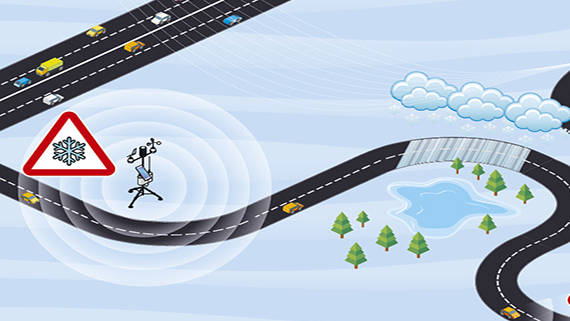The future of intelligent transport on the agenda in ITS European Congress
 Kuva: Anna-Leena Väätänen
Kuva: Anna-Leena VäätänenThese are some of the questions to be tackled at the ITS European Congress organised in Glasgow, Scotland during 6-8 June. A number of experts from various fields have been invited to a panel discussion organized by the Finnish Meteorological Institute (FMI) on 8th of June. The panellists are Contact Manager Janne Miettinen from FMI, Frans op de Beek (Principal advisor of traffic management, Rijkswaterstaat, The Netherlands. Founding member of the Amsterdam group), Paul Bridge, (Transportation Business Unit Director for North America, Vaisala Inc.), Alain Servel (Director of R&D in OBU ADAS systems, PSA Peugeot Citroen), and Jorge Alfonso Kurano (Research Coordinator, Technical University of Madrid, Coordinator of EU FP7 FOTsis-project)
Cars producing and supplying data in future
With their smartphones and other mobile devices, motorists and other road users can access versatile services that are produced by different actors utilising localisation data. The intelligent traffic system is based on the principle of utilising information and communications technology to improve the functioning and safety of traffic. Completely new kinds of ideas that have so far not been applied efficiently are under development. Automatic, wireless communication between cars is one example. Innovations in devices that are under development, such as friction measurements, can bring an upheaval to future transport. Increasingly accurate, locally tailored and frequently updated road weather forecasts will help improve traffic safety and efficiency.
‘Indeed, intelligent traffic is often regarded merely as a channel for supplying information about the weather and roads to road users. However, it is also possible to utilise this data in meteorological research, product development and production. Modern vehicles and the observation units along the roads make available a wealth of weather observation data, and meteorological research has taken an increasing interest in making use of these data,' says Dr. Timo Sukuvaara, head of group at the of FMI.
"The challenge is how the data can be collected and assimilated in a practical, efficient way, since the data originating from vehicles do not directly match with traditional weather observation data. ‘It is an interesting and demanding challenge requiring multidisciplinary expertise", Sukuvaara says.
More information:
Head of Group Timo Sukuvaara, tel. +358 40529 4977, timo.sukuvaara@fmi.fi
Head of Group Pertti Nurmi, tel. +358 50 500 3610, pertti.nurmi@fmi.fi
http://glasgow2016.itsineurope.com/
Panel discussion (SIS 38): 8 June 16.00–17.30. Dochart 2-room, Scottish Exhibition and Conference Centre (SECC), Glasgow.